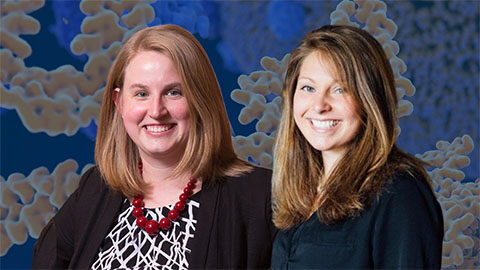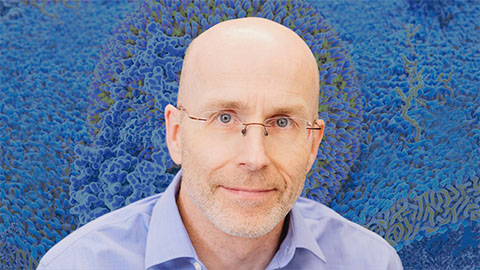A Nobel for biochemistry underlying COVID-19 vaccines
Hungarian-born Katalin Karikó and American Drew Weissman today won the 2023 Nobel Prize in physiology or medicine “for their discoveries concerning nucleoside base modifications that enabled the development of effective (messenger) RNA vaccines against COVID-19.”
Karikó and Weissman performed the groundbreaking research at the University of Pennsylvania and published their earliest findings in the late 1990s and early 2000s.

Their work was all about demonstrating that an mRNA vaccine must find the “Goldilocks” zone while interacting with the immune system. Too much recognition by the immune system by an mRNA vaccine could lead to immediate elimination of the vaccine material and intense patient symptoms. On the other end of the spectrum, too little mRNA interaction with the immune system could make the vaccine to go undetected, failing to induce the required immunity to protect a patient from future disease.
Karikó and Weissman found the answer in pseudouridine, a naturally occurring, posttranscriptional RNA modification of the building block uridine that alters RNA–RNA and RNA–protein interactions and affects gene expression.
Kariko was senior vice president and head of RNA protein replacement at BioNTech until 2022 and has since acted as an adviser to the company. She is also a professor at the University of Szeged in Hungary and an adjunct professor at the UPenn School of Medicine. Weissman is a professor of vaccine research at the UPenn School of Medicine. The two met at the university in the late 1990s while using a photocopier, according to a UPenn press release.
In 2004 in the Journal of Biological Chemistry, Karikó and Weissman detailed that mRNA secondary structure activates the immune system to produce proinflammatory cytokines via binding to Toll-like receptor 3, a nucleotide-sensing TLR that is activated by double-stranded RNA, a sign of viral infection or necrotic tissue.
One year later, Karikó and Weissman demonstrated how nucleoside modifications can suppress the immunological response to RNA stemming from bacteria or necrotic tissue. They published their findings in the journal Immunity in a paper titled “Suppression of RNA recognition by Toll-like receptors: The impact of nucleoside modification and the evolutionary origin of RNA.”
Karikó and Weissman further refined the production of laboratory transcribed mRNA for COVID-19 vaccination by optimizing the use of pseudouridine to suppress the capacity of vaccine mRNA to activate immune cells called dendritic cells. They found that incorporating pseudouridine, as a replacement of uridine, into the lab transcribed mRNA could suppress unwanted immunological side effects of vaccination.
Thomas Perlmann, the secretary of the Nobel Committee for Physiology or Medicine 2023, phoned each laureate before making the public announcement in Swedish and English. "They were very happy,” Perlmann said. He inquired whether the scientists were surprised by the announcement because he suspected “they may not be, having received many prizes.” However, both Karikó and Weissman were surprised and overwhelmed by the news, Perlmann said.
Ann Stock, president of the American Society for Biochemistry and Molecular Biology and professor of biochemistry and molecular biology at Rutgers University, said she hopes the prize will motivate current and future students to study biochemistry.
“The awarding of the Nobel prize to two biochemists for the application of pseudouridine to development of mRNA therapies highlights the relevance of fundamental biochemistry and should be motivational for students, especially medical students, who sometimes lack enthusiasm for learning about the nucleoside and amino acid building blocks of nucleic acids and proteins,” Stock said.
This achievement was particularly overwhelming for Karikó, Perlmann said, because she never received a tenured position at UPenn or an R01 grant from the National Institutes of Health, which Perlmann described as a “clear sign that she struggled and didn't get recognition for the importance of her vision.”
JBC Editor-in-Chief Alex Toker offered his congratulations to the Nobel laurates.
“Their discovery … was instrumental in the design of mRNA vaccines and ultimately paved the way for the development of the COVID-19 vaccine therapies that saved millions of lives during the recent pandemic,” Toker said. “This underscores the importance of fundamental discoveries in basic mechanisms of cell and molecular biology and their transformative impact on human health. I applaud the Nobel committee for recognizing these two extraordinary scientists and their discoveries.”
Gunilla Karlsson–Hedestam, chair of the Nobel committee, emphasized how much this “flexible and fast” platform has and will continue to impact the general population and cited current research developments on influenza and therapeutic cancer mRNA vaccines.
Craig Martin, a professor of chemistry at the University of Massachusetts Chan Medical School who studies the structure and function in enzyme–nucleic acid interactions, added: “Karikó and Weissman have launched a field that is just now emerging. mRNA vaccines are just the beginning. mRNA can deliver therapeutic proteins to cells and offers the promise of personalized cancer therapies. It is truly an exciting time for mRNA!"
Vaccine skepticism has plagued the public and made many pause before getting immunized against SARS-CoV-2. In fact, early in the COVID-19 pandemic, 31.6% of the U.S. population was unsure about receiving a vaccine, and 10.8% stated that they would refuse.
During a Q&A session after the announcement, a reporter asked the Nobel committee representatives if they considered the prize a “powerful strike back for the anti-vaccine movement.”
Olle Kämpe of the Karolinska Institutet, vice chair of the committee, noted that more than 13 billion people have gotten the vaccine and that, while the award would probably not sway those most resistant, "giving a Nobel Prize for this COVID-19 vaccine may make hesitant people take the vaccine and be sure it's very efficient and safe."
Randy Schekman, who received the 2013 Nobel Prize in physiology or medicine for his work on the “discoveries of machinery regulating vesicle traffic,” said: “This morning’s announcement is a welcome antidote to the toxic nonsense spread by vaccine skeptics who use misinformation to sow confusion and doubt.”
Enjoy reading ASBMB Today?
Become a member to receive the print edition four times a year and the digital edition monthly.
Learn moreGet the latest from ASBMB Today
Enter your email address, and we’ll send you a weekly email with recent articles, interviews and more.
Latest in People
People highlights or most popular articles

Redefining lipid biology from droplets to ferroptosis
James Olzmann will receive the ASBMB Avanti Award in Lipids at the ASBMB Annual Meeting, March 7–10, just outside of Washington, D.C.

Creating change in biochemistry education
Pamela Mertz will receive the ASBMB William C. Rose Award for Exemplary Contributions to Education at the ASBMB Annual Meeting, March 7-10 in Washington, D.C.

Amacher, Pollock named Henry Dreyfus scholars
They were recognized for their outstanding research scholarship and a deep commitment to undergraduate education and each received $75,000 to fund their research.

Trainee mentorship as immortality
Suzanne Barbour will receive the ASBMB Sustained Leadership Award at the ASBMB Annual Meeting, March 7-10 in Washington, D.C.

Life in four dimensions: When biology outpaces the brain
Nobel laureate Eric Betzig will discuss his research on information transfer in biology from proteins to organisms at the 2026 ASBMB Annual Meeting.

Fasting, fat and the molecular switches that keep us alive
Nutritional biochemist and JLR AE Sander Kersten has spent decades uncovering how the body adapts to fasting. His discoveries on lipid metabolism and gene regulation reveal how our ancient survival mechanisms may hold keys to modern metabolic health.

